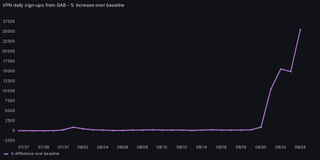Gabon elections: people turn to VPNs fearing potential internet blocks
Proton VPN confirmed a 25,000% spike in sign-ups

People in Gabon have been reported turning to VPN services amid growing tensions ahead of crucial elections set to take place on August 26, 2023.
Proton VPN recorded a considerable spike in sign-ups via its VPN Observatory, in fact, starting from the week prior to the big day.
A clear cause for such an increase in VPN usage is yet to be confirmed. However, similar patterns have been recorded in other countries as citizens increasingly get ready to face internet disruptions during times of political turmoil, such as elections or protests. For instance, Turkey VPN downloads skyrocketed during the latest Presidential elections due to a high risk of information blackout.

"Proton VPN has seen sign-ups in Gabon spike by more than 25,000% over the course of this week, growing for the last four days in a row with no sign of slowing," a Proton spokesperson told TechRadar.
Even more interestingly, such high VPN usage is actually a new trend across the region. "We haven’t seen much evidence of the Gabon population using VPNs in the past," said a Proton spokesperson. They noted, "However, it's possible that people are signing up ahead of the election because they suspect censorship or internet disruption might be imminent."
Gabon elections: how likely is an information blackout?
The stakes are high for people in Gabon as the day for its presidential, legislative, and local elections approaches. A history of post-election clashes and internet shutdowns is adding to an already tense climate across the country.
Gabon restricted the internet on multiple occasions over recent years, in fact. In 2021, reports of internet throttling were recorded during protests related to government COVID-19 measures. Also in 2019, Gabonese authorities cut off access to the internet and broadcasting services following an attempted coup d’etat.
Get daily insight, inspiration and deals in your inbox
Get the hottest deals available in your inbox plus news, reviews, opinion, analysis and more from the TechRadar team.
Even more worryingly, in 2016 the government pulled the plug on the internet following violent clashes as citizens protested the latest electoral win of current Gabonese President Ali Bongo Ondimba.
That's why Access Now and over 300 organizations supporting the #KeepItOn Coalition are urging the Gabon government to ensure full and secure internet accessibility during these crucial days.
All eyes are on Gabon! 🇬🇦🗳️ People in Gabon will head to the polls on 26 August to vote in the country’s general elections.@PresidentABO must keep the internet on throughout the election period. #KeepItOnhttps://t.co/NgWcl9oKifAugust 24, 2023
"The internet and social media platforms play a critical role in enabling and enhancing participatory governance in democratic society," wrote experts. "They provide space for communicating, engaging in public debate, seeking information on election processes and candidates, reporting and documenting events and outcomes, and holding governments accountable for their actions."
August 25 elections are a crucial moment for people in Gabon battling against rampant poverty levels.
We invite everyone in Gabon to head to our free VPN page to pick the safest freebie service before the voting kicks off.
The need to boost up a shattered economy—according to Reuters, one in three young people in Gabon are unemployed—is at the core of the main opposition candidate Albert Ondo Ossa's campaign, in fact.
Yet, President Bongo is doing his best to win a third term and preserve his family's decades-long grip on power—56 years, to be precise.
Tensions are rising across opposition parties also for an alleged lack of transparency amid recent changes to the electoral process, including a shift to a single-round ballot and restrictions on the number of party reps permitted at polling stations. The possibility of an information blackout is backed up by reports of foreign journalists being prevented from reporting on the elections.
Despite not being useful with total internet blackouts, a VPN or similar circumvention tools (like Lantern or Tor Browser) allow users to quickly bypass geo-restrictions by spoofing their real IP address.


Chiara is a multimedia journalist committed to covering stories to help promote the rights and denounce the abuses of the digital side of life—wherever cybersecurity, markets and politics tangle up. She mainly writes news, interviews and analysis on data privacy, online censorship, digital rights, cybercrime, and security software, with a special focus on VPNs, for TechRadar Pro, TechRadar and Tom’s Guide. Got a story, tip-off or something tech-interesting to say? Reach out to chiara.castro@futurenet.com
Most Popular




